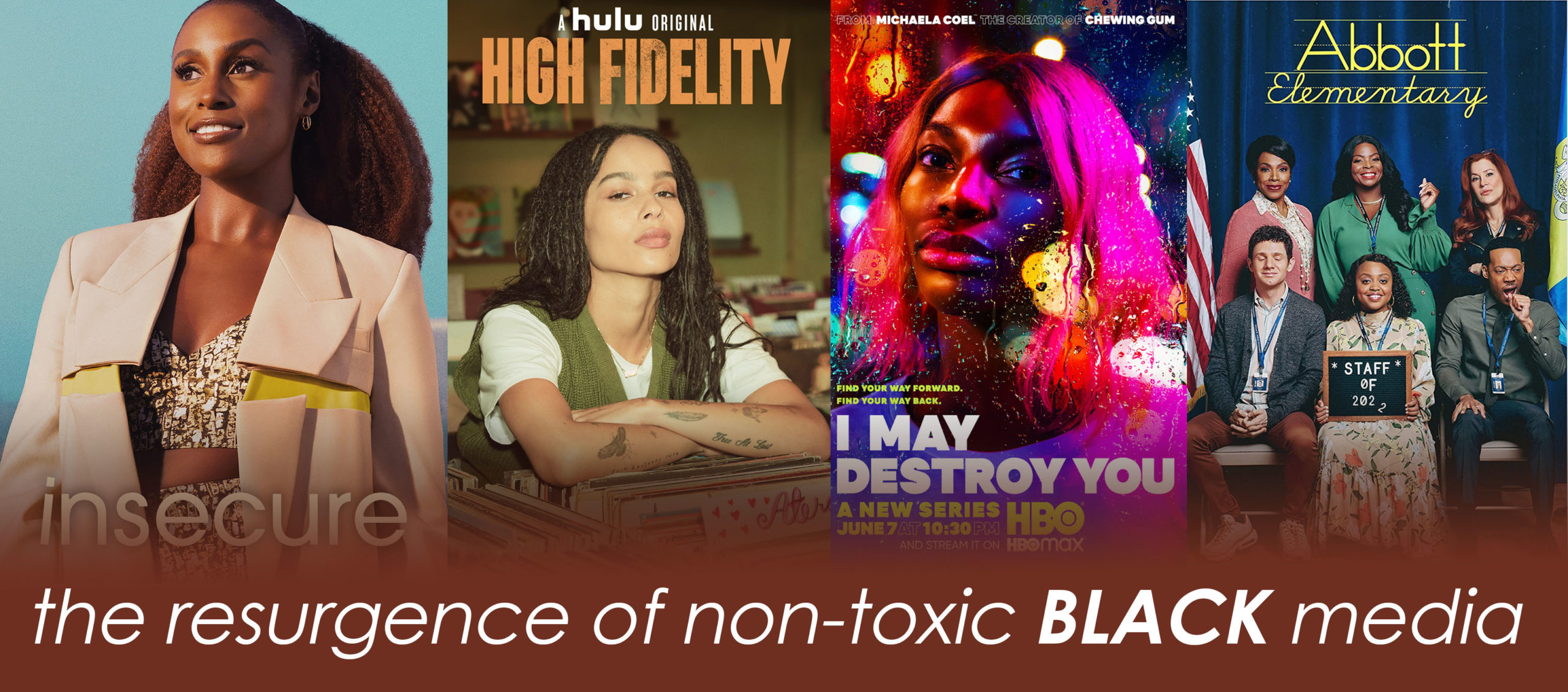I don’t watch much TV. I don’t watch many movies.
It’s not because I don’t want to, but more like I can’t. I can’t make myself watch people that don’t look like, live like, or think like me fall in love and experience heartbreak and face rejection and even do mundane things like go on road trips. This applies to the real world, and it applies to worlds made up by screenwriters and directors. This sentiment is not because they don’t deserve to, but I deserve to as well. I deserve these things in as much abundance as they have.
My generation didn’t have much non-dramatic Black media to ingest coming up. I’m comparing this to Spike Lee’s era. I’m comparing this to the eras of “Girlfriends” and “Moesha.” We barely had “The Proud Family,” which was almost off-air by the time we got old enough to even retain major amounts of information.
Of course, I wonder, what happened? What made the “Love Jones” and “Do The Right Thing” magic disappear from Black media? What made drug, rape, and sports stories replace those already fine narratives? What made the wives become lighter and lighter, and what made Hollywood stop casting dark-skinned women for lead roles? Why did things have to change?
However, that is not the focus of this piece. The focus of this piece is to focus on the fact that it seems like our society might be trying to grow out of this rough patch we’ve been enveloped in. For anyone interested in delving further into the “why’s” of Black cinema, The Guardian wrote a comprehensive piece here.
We have our first Black superhero on film. We have beautiful documentaries like Beyoncé’s Homecoming. We have shows like “Insecure” by Issa Rae surviving and thriving for five entire seasons. We have progression coming from this regression.
I really want to harp on “Insecure.” This is a show about a dark-skinned, 30-something woman who works a 9-to-5 and can’t make rent for many months. However, it is not about Black pain. It is not about Black poverty. It is simply a tale of this woman, her friendships, her romantic relationships, and her journey towards finding herself over and over again as an adult.
Watching “Insecure” makes me laugh. It makes me smile. It makes me cringe. It makes me bop my head because Issa Rae sure knows how to pick a soundtrack. It makes me feel emotions other than dread about being who I am. Issa Rae continues to push the envelope in regards to Black normality. However, this normality is displayed in such a way that it cannot be perceived as anything but excellence.
Beyoncé bolstered her diamond-grade music career to make things that matter to us. She was the first Black woman to ever headline Coachella, and she took the opportunity to create a fully-fledged documentary with Netflix. This documentary, laced with sounds and words from greats like Nina Simone, was a testament to Black artistry. Black Power. Black Creation. Black Victory.
Then she released “Black is King.” It represented us as the stars and the moon. It represented us dripping in jewels. It was pure and motherly and raunchy all the same. It was important.
People like Beyoncé and Issa Rae, on all levels, are pushing the envelope. They are making sacrifices that we do not see for us to be able to see ourselves. Their decision to is not popular, hence why they are some of the only large-scale individuals in their genre.
“High Fidelity” wasn’t as huge of a hit. It features starlet Zöe Kravitz and is available on Hulu. It was about a Black woman and her record shop. She loved music. She loved a man who chose not to love her anymore. “High Fidelity” was one of the few shows that tugged at my heartstrings so hard that I finished it and never looked at it again, as if to not taint the pure feelings of emotion that it evoked in me the first time. “High Fidelity” is an example of someone who tried to push the envelope, and was able to get somewhere, but was not able to follow through. The show was cancelled after only one season.
So, when I talk about us moving forward, I talk about us moving forward. There are people, many, who are making strides to create beautiful things for us. At that point, the responsibility to see them through falls on us as watchers.
Shows like “High Fidelity,” “The Wonder Years” (which is a Lee Daniels-directed reboot of the popular 1980s and 90s series of the same name), “I May Destroy You” (available on HBO Max), and more require a whole lot more to survive than shows that follow the dangerous narratives that have been forced on us for so long. Most recently, the show “Abbott Elementary” which is a mockumentary about inner-city schools and the teachers within them was able to break through those barriers. It is one of the most-watched shows on ABC running today.
We continue to watch these things because they’re what is comfortable for us, and in a lot of ways, we can relate to them. However, in order for us to do better, we must believe we deserve better. That starts with the image we see in the mirrors all around us.




